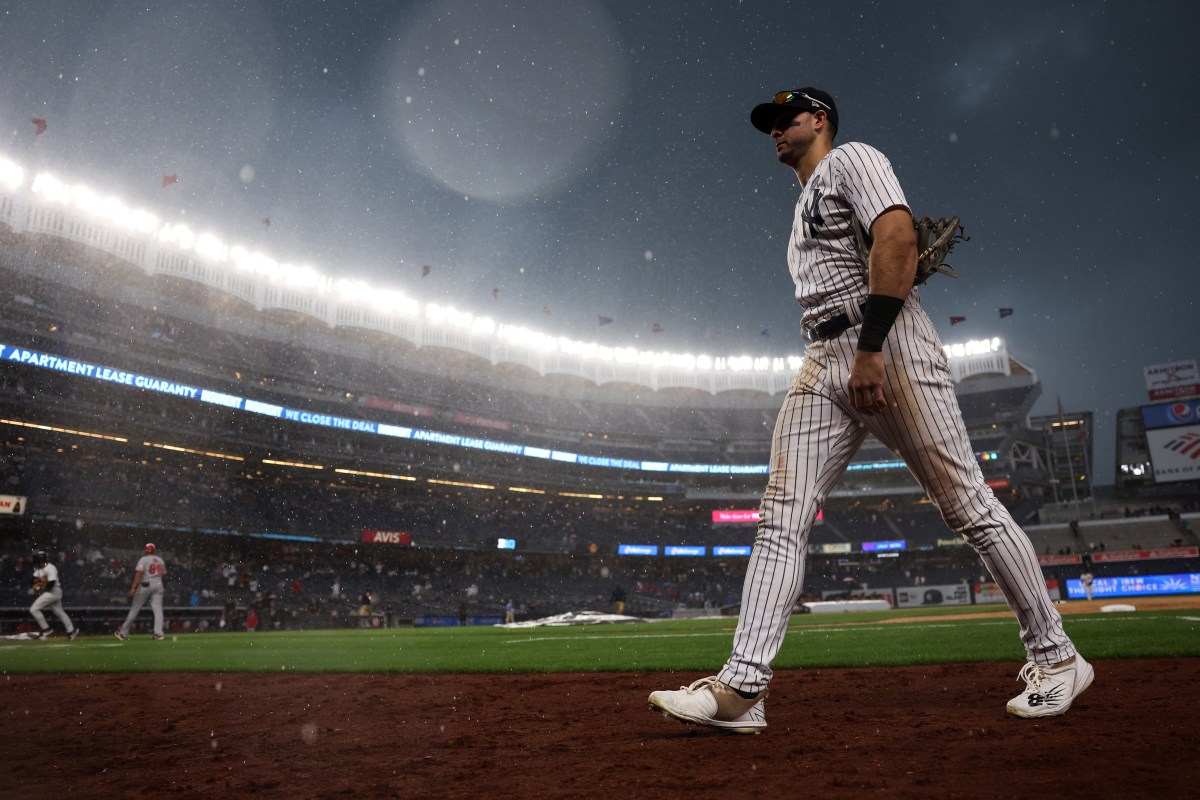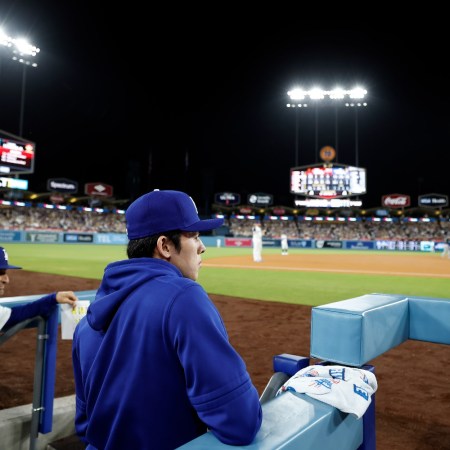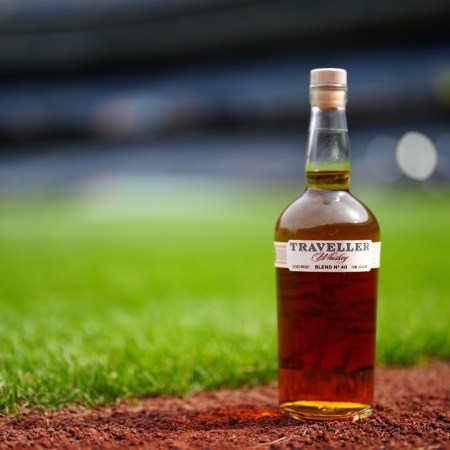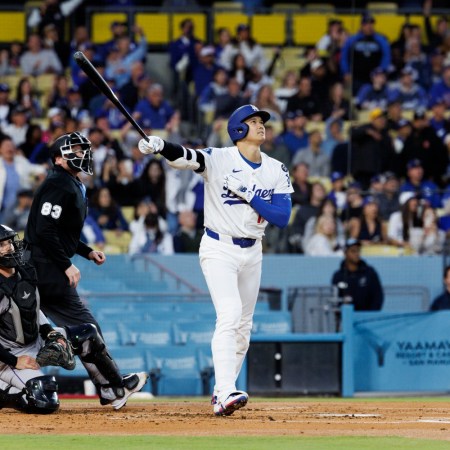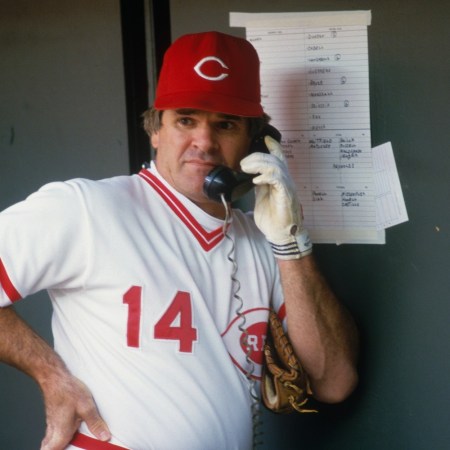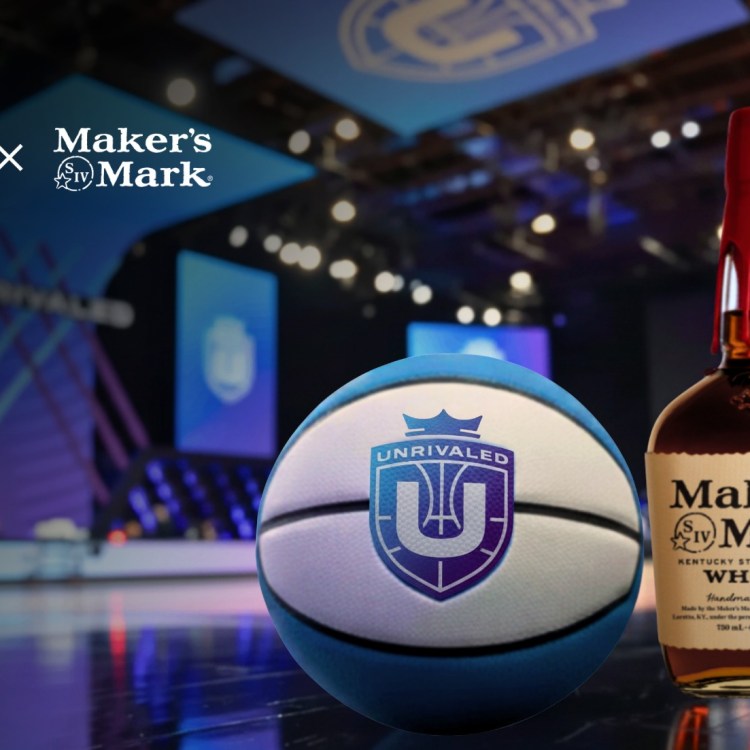On March 24th, the New York Yankees social media accounts posted a video captioned “Joey G. on the mic.” It featured their embattled outfielder Joey Gallo — whom they acquired in a deadline deal with the Texas Rangers last summer — cycling through spring training workouts with a grin on his face and a tiny microphone hidden somewhere in his lapel.
He’s breezy and unburdened in the video; at various points, he jokes about Giancarlo Stanton’s obsession with protein powder, asks the camera to get a shot of Gleyber Torres sprinting to a different practice field (noting the young second baseman apparently never reads the schedule) and tries to convince other players that Aaron Judge is the one who’s actually mic’d up. This causes quite the stir, and teammates begin playfully dodging the cameras. Towards the end of the video, Gallo launches a batting practice pitch into the seats and imagines where it would land in The Bronx. “Second-deck!” he proclaims.
This is a typical portrait of the ballplayer as goofball. Players take turns assuming this character in big league clubhouses. It’s a necessary one; these men eat, sleep and travel with each other for eight months out of the year. They adopt each others’ ritualistic ticks and sacrificial mannerisms. They defend each other (often irrationally, sometimes physically, on as public a stage as you could imagine) over perceived injustices. Theirs is an underworld constantly on display, every night, for the rest of the world. Levity and fraternity are essential to make it through the grind in one piece.
Where the fans fit into this paradigm is unclear, and has become even more complex since the advent of social media. You can see the sympathetic gears that were turning in the head of some front office social media manager while outfitting Gallo with a microphone last spring. This was a good guy, liked by his teammates, simply coming off a tough year. Gallo was hitless in the Yankees’ defeat to the Red Sox in last postseason’s one-game Wild Card. That the team managed just two runs was immaterial to most of the fanbase. Gallo, the “three-true outcome” prototype — and one perpetually flirtatious with the Mendoza line — had underperformed down the stretch. This was inexcusable.
Pete Rose, charmer that he is, lent his thoughts to the media a week later: “That was the worst fucking lineup they could have put on the field. Their six, seven, eight, nine hitters were all out-men. They had to have Judge and Stanton do something. If they didn’t, all of the pressure was on Joey Gallo. You saw how that worked out…How does someone who didn’t play every day strike out 213 times? Ray Charles wouldn’t strike out that much. I just can’t imagine striking out 213 times without killing myself.”
Gallo was traded to the Los Angeles Dodgers yesterday for a minor league hurler. According to Yankee insiders, he was packing his locker two days ago, absolutely convinced his time with the team was over.
By all accounts, after Rose’s comments — and those of many other radio pundits and armchair experts — Gallo worked to rectify his swing and approach this offseason. He isn’t a lazy person. He’s a professional ballplayer who’s hit over 40 home runs twice, and won multiple Gold Gloves patrolling the outfield grass. He’s also a lifelong Yankees fan — as was widely reported when he joined the team last year. His parents are originally from the New York metro area. And his contract expires after this year. What more incentive could he have possibly needed to succeed in pinstripes?
But those pinstripes, as YES broadcaster Cameron Maybin noted so eloquently this week, weigh heavier for some players. (Maybin incidentally also has the top comment on the Gallo video from last March. He wrote: “I love this! @joeygallo24 is a vibe.”) Gallo didn’t see too many home runs reach the second-deck in The Bronx. He has just 12 home runs this year, and 25 hits total, otherwise. Eight of these home runs (and 21 of his total hits) have occurred on the road, where he has driven in more runs, scored more runs and walked more.
New York morphed into a living nightmare for Gallo this season, which is especially shocking considering the Yankees are enjoying their most productive year since 1998 — universally considered one of the franchise’s best-ever. En route to a record that has had them atop the American League since early May, Gallo was the lone sour spot amongst position players; some sportswriters observed that while his teammates celebrated on their way off the field each night, he looked downtrodden, perhaps still processing another three-strikeout performance.
Yankee fans could not accept this blight on what had otherwise started to feel like a perfect season. Aaron Judge was putting together an MVP campaign, wily journeyman Nestor Cortes made it to the All-Star game and guys like Clay Holmes, Anthony Rizzo and Jose Trevino were all excellent bounce-back stories. In mid-May, WFAN radio personality Craig Carton blasted Gallo on air, concluding the 28-year-old had no right to play on such a historic team: “How about a little something we call work ethic? How about practice? How about being a professional? You’re batting .190! You’re telling me it’s gonna get worse? You gotta go. You’re making $12 million a year, you can’t play here anymore.”
In hard-nosed sporting cities like New York, Boston and Philadelphia, there is a bizarre, broadly accepted concept that tough love is one-size-fits-all. Media attention is relentless, and online warriors work for free, producing an endless merry-go-round of complaints and critiques (which aren’t afraid to veer profane or violent in nature).
In these crucibles of competition, everyone agrees, the ultimate competitor is one who wants the extra attention, who thrives on it. When the Yankees signed Gerrit Cole, their $300 million starter, he assured the press corps that “pressure is a privilege” in his introductory interview. They were smitten off the bat: the new ace had aced his first impression. Guys like Derek Jeter, or Judge, and even Stanton — who settled into a productive rhythm after hearing boo-birds his first year — have been lauded as models of consistency and clutch play. Basically: if you can make it here, you can make it anywhere. If you can’t make it here, go fuck yourself.
Fans also have a habit of convincing themselves that they are responsible for molding players into the best versions of themselves. If he isn’t playing well, let’s let him hear it. Then maybe he’ll summon the grit to hit a home run in the eighth, when we really need him to deliver. But this line of thinking is bereft of any emotional intelligence. Gallo is a human being, playing an extremely difficult game, on that game’s brightest stage, where even the best players ever (playing their best seasons ever) can expect to fail more than 60% of the time. There shouldn’t be a shred of doubt that Gallo wanted to succeed. He desperately wanted to be a contributor to the team’s title run. But after a while, you have to ask: did Yankee fans want him to succeed?
Yankees fans insisted on imagining Gallo as a rogue, electively unproductive employee. He was an entitled bust — why else would he refuse to play to his multimillion-dollar contract? — and deserved to be reminded as such, as often as possible. But not once did the fanbase consider “managing” him with a lighter touch. There was no patience, no solidarity, no sympathy. This weighed horribly on Gallo. Earlier this week, he shared some of the saddest sound bites you’ll ever hear from a professional athlete.
“I don’t know how [Yankee fans] usually are, but I don’t know how much tougher they can get,” he said. “Pretty much every team we play, players from that team reached out to me to say, ‘Hey, bro, keep your head up. Don’t listen to them.” On those words of encouragement, Gallo said: “It made me feel like a piece of shit, honestly…I went through a lot of adversity and I really had to question myself a lot. My confidence suffered. I would say I hit rock bottom for the big leagues.” He also shared that he stopped “going out in the streets” because he didn’t “want to show his face” in New York anymore. “Every time I see a Yankees hat, every time I see a Yankees jersey, it’s something I’m going to have to understand. I didn’t play well as a Yankee. I wish I had.” That’s trauma in a nutshell.
Some fans of the modern MLB express frustration with how chummy players have gotten with managers — consider the disparity between 1990s Buck Showalter, he of the permanent scowl, with the 66-year-old version of the skipper today. His New York Mets regularly rub his belly after wins. But symbiotic manager-player relationships don’t just liven up locker rooms during the long slog of the season; they create an extra buffer between the pitchforks of a highly-demanding fanbase and the mental health of a discouraged player. Not once did Aaron Boone ever forsake Gallo to the press, and after he was shipped to the Dodgers yesterday, the Yankees manager provided a dose of perspective: “I think the burden and pressure probably impacted some mechanical things that need to go on when you are in the box. Clearly, this place had an adverse effect on Joey…”
As Gallo’s struggles mounted, the tenor of Yankee fans became, oddly, somewhat gleeful. There is a pervasive masochism in sports — even amongst the diehards for the winningest sports team ever founded. Gallo was the poster boy for any game that didn’t go the Evil Empire’s way. That Judge had more home runs than Gallo had hits became a running meme on Yankee Twitter, and in early July, a video of a fan — on the phone with his friend while watching the game — predicting Gallo would strike out in a crucial spot went viral. The man screamed in faux-agony, clearly pleased to have been proven right.
Joey Gallo didn’t play up to expectations this year — not those of Brian Cashman nor The Bronx at-large. But it’s important to note that he didn’t play to those he set for himself, either. This is not what he imagined when he was mic’d up five months ago. Perhaps Gallo will enjoy a renaissance with the first-place Dodgers. Or perhaps, if the baseball gods have a sense of humor, he’ll meet the Yankees in the World Series later this year. We don’t know. But the short, sad saga of Gallo’s time with the Yankees should serve as a reminder that bullying players is no guarantee they’ll succeed. New York loves to think of itself as a pressure-cooker. But ballplayers are far more than just meat and bones.
The Charge will help you move better, think clearer and stay in the game longer. Subscribe to our wellness newsletter today.
